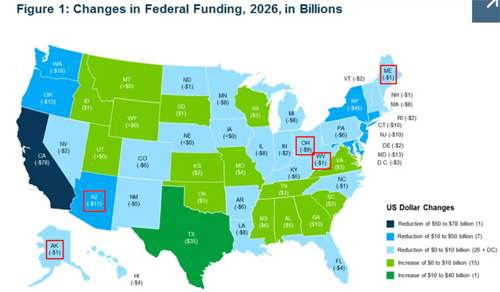
Hubert Humphrey at the 1948 Democratic National Convention
Hubert Humphrey’s Civil Rights speech at the 1948 Democratic National Convention was one of the great moments in the party’s history.
“Friends, delegates, I do not believe that there can be any compromise on the guarantees of the civil rights which we have mentioned in the minority report,” he said. “In spite of my desire for unanimous agreement on the entire platform, in spite of my desire to see everybody here in honest and unanimous agreement, there are some matters which I think must be stated clearly and without qualification. There can be no hedging — the newspaper headlines are wrong. There will be no hedging, and there will be no watering down — if you please — of the instruments and the principles of the civil-rights program.”
Humphrey was speaking in support of the civil rights plank of the 1948 Democratic Party platform, which said this:
The Democratic Party is responsible for the great civil rights gains made in recent years in eliminating unfair and illegal discrimination based on race, creed or color,
The Democratic Party commits itself to continuing its efforts to eradicate all racial, religious and economic discrimination.
We again state our belief that racial and religious minorities must have the right to live, the right to work, the right to vote, the full and equal protection of the laws, on a basis of equality with all citizens as guaranteed by the Constitution.
We highly commend President Harry S. Truman for his courageous stand on the issue of civil rights.
We call upon the Congress to support our President in guaranteeing these basic and fundamental American Principles: (1) the right of full and equal political participation; (2) the right to equal opportunity of employment; (3) the right of security of person; (4) and the right of equal treatment in the service and defense of our nation.
This platform also said “We favor legislation assuring that the workers of our nation receive equal pay for equal work, regardless of sex,” and called for some kind of national health care. Seriously, this is a very progressive platform, the domestic policy section especially. The Dems would have to update the foreign policy section, but the domestic policy section could be adopted in 2020 with just a little tweaking.
Did I mention this was said in 1948?
Of course, there were many years of struggle ahead before the Civil Rights Act of 1964 made discrimination illegal. Martin Luther King and the Civil Rights movement forced the Democratic Party to introduce that law, and we’re still struggling to fully implement that law. My point is that before change could happen, somebody had to stand up and say this. Somebody had to commit to this. Somebody had to say, this is the right thing to do.
I’m sure Hubert Humphrey didn’t expect racial discrimination to disappear after the election. As it was, the entire Mississippi delegation and half of the Alabama delegation stomped out of the convention in protest of the civil rights plank. Two weeks after the convention, President Truman issued executive orders mandating equal opportunity in the armed forces and in the federal civil service. Southern segregationists organized to form a “states’ rights” party and nominated Strom Thurmond as its presidential candidate. Civil rights was a divisive issue for Dems in 1948. But they adopted that platform because it was the right thing to do.
Today, we’re squabbling over an issue that shouldn’t be that divisive — universal health coverage. Whether you call it “single payer” or “Medicare for All” or just “universal coverage,” by now it should be obvious to anyone with a functional brain that achieving this is going to require some sort of national, taxpayer-supported system that sidelines for-profit insurance companies and includes controls to prevent price gouging. It’s almost certainly going to mean phasing out job-based group insurance. Beyond that, the hundreds of other nations that provide universal coverage for its citizens have gone about this in various ways, not all of them “single payer,” strictly speaking. We should be studying them.
The hysterical reaction against the Affordable Care Act never made sense, if you realize that just about all the ACA did was regulate health insurance to force insurance companies to cover more people and provide some subsidies so that poor people could pay the private insurance company premiums. That the premiums were still not affordable for a lot of folks is largely the fault of the insurance companies, and indeed it’s the fault of the whole idea that private-for profit insurance can pay for most medical care with affordable premiums and without bankrupting people. It can’t. All the other nations of the world figured that out a long time ago.
But in the U.S., the insurance companies, the medical-industrial complex and the conservative media-think tank network that largely controls public opinion have made universal coverage a taboo subject. Until now.
There are 16 Democratic senators supporting the bill, a remarkable number considering where the healthcare debate was two years ago, when Sanders first campaigned for president as a democratic socialist long shot. At the time, pundits, political operatives and countless elected officials dismissed the single-payer Sanders dream as a disingenuous moonshot.
Now, the man who told Obama to lay off Bain Capital (Cory Booker) and the woman who once voted in favor of withholding federal funds from sanctuary cities (Kirsten Gillibrand) are co-sponsors of Sanders’ bill. Times, indeed, have changed.
Some are not persuaded.
In an interview with Vox’s Ezra Klein, Clinton repeated attacks on single-payer she made during her primary campaign against Sanders, arguing that more modest measures like a public insurance option or a Medicare buy-in for people 55 and older are more realistic and achievable.
“I don’t know what the particulars are” on Sanders’s latest plan, Clinton said, but added, “He introduced a single-payer bill every year he was in Congress — and when somebody finally read it, he couldn’t explain it and couldn’t really tell people how much it was gonna cost.”
She clarified that she’d support a bill opening up Medicare or Medicaid and cutting prescription drug costs, but cautioned, “I think it’s going to be challenging if within that bill, there are tax increases equivalent to what it would take to pay for single-payer, and if you’re really telling people — about half of the country — that they can no longer have the policies they have through their employer.”
She noted that this issue arose in 1993-94, when she was crafting a health reform plan in the Bill Clinton administration, and she concluded then that the forces arrayed against single-payer, not least of which were the public’s fears about such a program, were insurmountable.
Those forces may have been insurmountable in 1993-1994; there are people who argue that the Clintons themselves blew the opportunity then, but let’s set that aside. I personally think it was insurmountable in 2008; just getting the ACA passed was a massive achievement at the time.
But it’s not 1994 any more. It’s not even 2008 any more.
I’ve long believed that universal health care would become politically viable in the U.S. as soon as a big enough part of the working and middle class in the U.S. realized that they are being screwed by the medical-industrial complex, and I think we’re about there.
When Mike Dukakis talked about health care reform in his presidential bid in 1988, all the Republicans had to do was trot out some hard hat guys with union benefits to talk about the great health coverage they had for a few dollars a month, and why mess with that? But those hard hat guys are harder to find these days.
In 1999, 67 percent of nonelderly Americans were covered by employee insurance. In 2014, that had fallen to 56 percent, as the old-fashioned full-time job with benefits became more and more elusive in the U.S. If we include all Americans, less than half are covered by employee benefit insurance now. See also “Let Them See How We Live. Let Them Come.”
People in the U.S. don’t know what solutions are possible because nobody tells them. Sanders’s cardinal sin, according to some, is that he stood up and told people what is possible. Apparently, according to some Democrats, this is not allowed. We are not allowed to speak the name of a thing until we have a fully formed program with all the details ironed out, and even then we must limit ourselves to those programs that are achievable in the near term, under current political conditions. This means Democrats negotiate with themselves until they come up with something that they think Republicans might accept, so that it can be watered down some more before passing.
Under those rules, Hubert Humphrey wouldn’t have been allowed to speak at the 1948 Democratic Convention, and the civil rights plank would have been axed from the platform. Yes, the 2016 Democratic platform has a section about “securing universal health care,” but the verbiage that follows is about protecting the status quo —
Democrats will keep costs down by making premiums more affordable, reducing out-of-pocket expenses, and capping prescription drug costs. And we will fight against insurers trying to impose excessive premium increases.
— and maybe throwing in a few tweaks to existing programs, but it offers nothing that looks anything like genuine universal coverage.
Paul Waldman wrote last week,
Support for some kind of universal coverage is now the consensus position among Democrats. And Sanders’ single payer plan is the one that has gotten the most attention, so it’s going to be the one against which other plans are measured.
But we have to understand this plan for what it really is: an opening bid. While he won’t say so himself, I doubt even Sanders believes that something in this form could pass through Congress. Even so, it represents an important strategic shift for the Democratic Party.
Waldman goes on to say that both Barack Obama and Bill Clinton tended to negotiate with themselves, giving away too much too quickly before negotiations with Republicans even started. On the other hand, Sanders’s Medicare for All asks for everything. It covers everything, without co-pays or deductibles. It even covers abortions. And, as a lot of people have pointed out, such a bill has no chance of passage in Washington now. But a watered-down bill has no chance, either.
Waldman continues,
This bill is being offered in 2017, when there’s a Republican president, a Republican House, and a Republican Senate. It doesn’t have to be realistic. It can be a way of saying, “This is what as Democrats we think a perfect health insurance system would look like.” In that sense, this bill could be extremely useful, since it will communicate the Democratic vision to voters in a way that isn’t too hard to understand. …
… Once the Sanders plan is in wide circulation, if I said, “How about an expansion of Medicaid to become a basic plan for all adults, while private insurance would still exist to offer supplemental coverage?”, you might now say that sounds pretty reasonable. If you did, it would mean that Sanders had effectively widened the debate and made what not long ago would have seemed like radical ideas look like moderate compromises.
Exactly. It tells people what is possible. It’s saying, we can have this, or something like this, if we demand it. We don’t have to put up with the status quo.
To me, one of the biggest mistakes Hillary Clinton made last year was not just to dismiss Sanders’s health care plan as politically untenable, but to compare even asking for universal coverage — which is what most people mean by “single payer” — to believing in unicorns. The widely circulated video of her proclaiming that single payer will “never ever come to pass” damaged her more than she seems willing to admit.
Josh Marshall wrote last week,
Medicare for All is a horizonal demand. It satisfies a basic need and does so by looking beyond the corrupt, meretricious system we now have. The activity of private insurance companies symbolize much that is wrong with contemporary capitalism. You don’t have to be a leftwinger from Park Slope to hate these companies. Believe me: a lot of those people who voted for Trump (whom the liberal elite dismisses as racists and misogynists) hate insurance companies.
While Medicare for All would cause an upheaval in the health insurance markets, it is actually based on expanding a system that works and that has remained intact for over fifty years. It’s incremental in its own way. It is also very easy to understand, while most of the incremental reforms I’ve seen require a degree in healthcare economics to comprehend and rarely seem to apply to “you.”
Unfortunately, a lot of Democrats are still too mired in learned helplessness to stand up for what’s right; see Democrats Against Single Payer by Branko Marcetic at Jacobin. So it’s going to be up to voters to continue to apply pressure on the Democrats to grow a spine. Watch them fold up like cheap lawn chairs as soon as Republicans begin their pushback. Socialized medicine! Higher taxes! Booga booga booga booga!
I say, let the Republicans go to their constituents and tell them no, you can’t have this. We must support the medical-industrial complex. We must support the rights of insurance companies to make lots of money, even if you or your loved ones are cut off from life-saving medical care for the sake of profit. Let the Republicans defend that position. Stop being afraid to stand up for the right thing.




